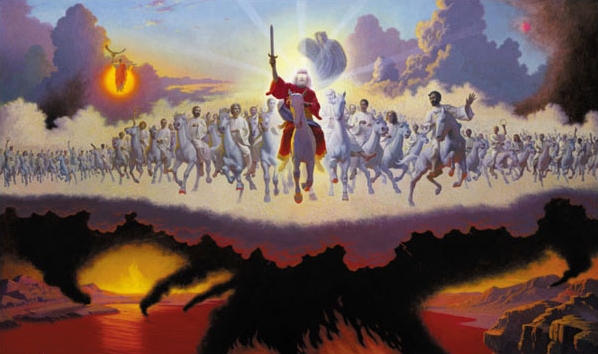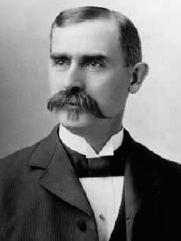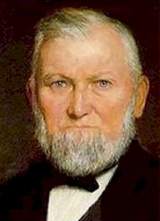Brigham Young
Brigham Young
In the Tabernacle in Salt Lake City, in General Conference, in the year 1859, Brigham Young, then President of the Church of Jesus Christ of Latter-day Saints, said a very strange thing! He said:
"Jesus has been upon the earth a great many more times than you are aware of. When Jesus makes his next appearance upon the earth, but few in this Church will be prepared to receive him and see him face to face and converse with him, but he will come to his temple." (Journal of Discourses 7:142)What did Brigham Young mean by this? Mormons believed that Jesus had been on the Earth one time, and he would come one more time and that is all. What in the "world" did Brigham Young mean by "many times". What did he mean that "few" would be prepared to receive him and converse with him when he came again? Mormons had no fear of not recognizing Jesus when he came again! He would come traveling on the clouds, with great armies in tow, with thousands of angels blowing trumpets, wearing red garments!

The Brethren (Mormon leaders) knew about the 1891 prophecies of Joseph Smith! They were very confident that they would be fulfilled! They could not ____ NOT ____ be fulfilled! Only a false prophet gave failed prophecies! And Joseph Smith was a TRUE Prophet of God! Thus, his 1891 Prophecies had to be fulfilled!

Mormon apostle Moses Thatcher said on October 14, 1886:
"It is my belief, that the time of our deliverance will be within five years; the time indicated being February 14th, 1891."(Journal of Abraham H. Cannon, Oct. 14, 1886, BYU Library)
In 1887, the Church itself published a book written by one Elder Robert Smith, for use in Sunday Schools to instruct children. The book was titled The Signs of the Times, and said:
"Now, we will prove by the prophet Joseph Smith that the year 1891, is the commencement of the Reign of Righteousness. In Section 130 of the Doctrine and Covenants, Joseph was told that if he lived to be 85 years old he would live to see the Redeemer on the earth." (Robert Smith, The Signs of the Times, Juvenile Instructor, 1887, p.1)

Brigham H. Roberts, a Mormon apostle, said in General Conference in Salt Lake City in October 1890:
"Before another General Conference shall be reached we shall have entered upon the year 1891. I shall read from Section 130 of the Book of Doctrine and Covenants, which relates to the coming of the Son of Man, and referred to some remarks made by the prophet, February 14th, 1835, at a meeting where certain Elders were told that they were called to go forth to prune the vineyard for the last time, before the coming of Christ, even 56 years should wind-up the scene. These these circumstances have called the Saints to believe that some great epock will open at that time--the year following the present. My faith in the matter is whatever the Lord has in mind to accomplish in that year will be performed. It may be something, however, that would scarecely create a ripple. The organization of the Church of Jesus Christ of Latter-day Saints was one of the greatest events in the history of the world. It was organized with six members, and but little was known concerning it even in the neighborhood where it occurred, at the time. It may be that the greatness of what shall occur in 1891 will not be comprehended until succeeding years." (Collected Discourses 2:105-6)

Heber J. Grant, a Mormon apostle (and later President of the Church) remarked after B.H. Roberts had spoken:
"I have been gratified with the remarks that have been made about events, which some have imagined will take place in 1891." (Collected Discourses 2:107)His saying "I have been gratified" means that he agreed with the remarks!

On the 21st of May, 1888, Wilford Woodruff, then President of the Mormon Church, was attending the dedication of the Manti ("man-tai") Temple in southern Utah. He uttered a prophecy at that event:
"We will not end the practice of plural marriage untilt he coming of the Son of Man." (Journal of John Henry Smith, 21 may, 1888, LDS Church Archives)Wilford Woodruff ordered that the Church no longer authorize any plural marriages after September of 1890 (Joseph Smith would have turned 85 years of age in late December of 1890).
On January 1st, 1891, Wilford Woodruff wrote in his journal:
"This is New Years' Day, and the year that has been looked upon by many as one of the most important years of the world." (Journal of Wilford Woodruf, Jan. 1, 1891)